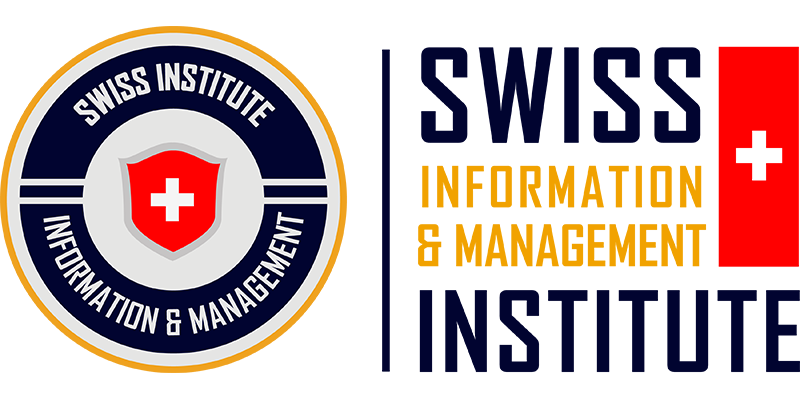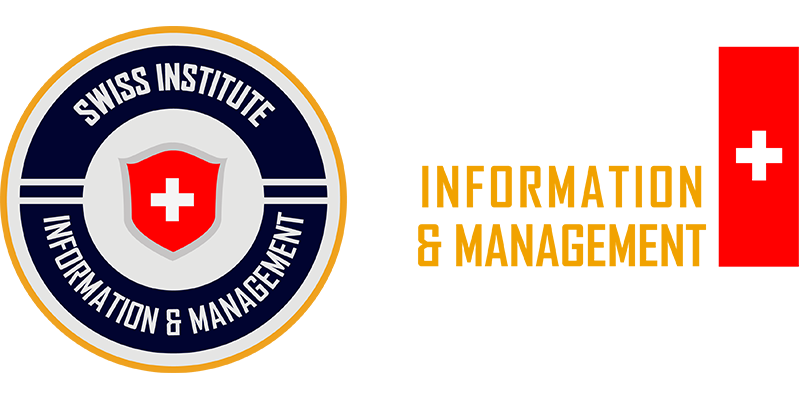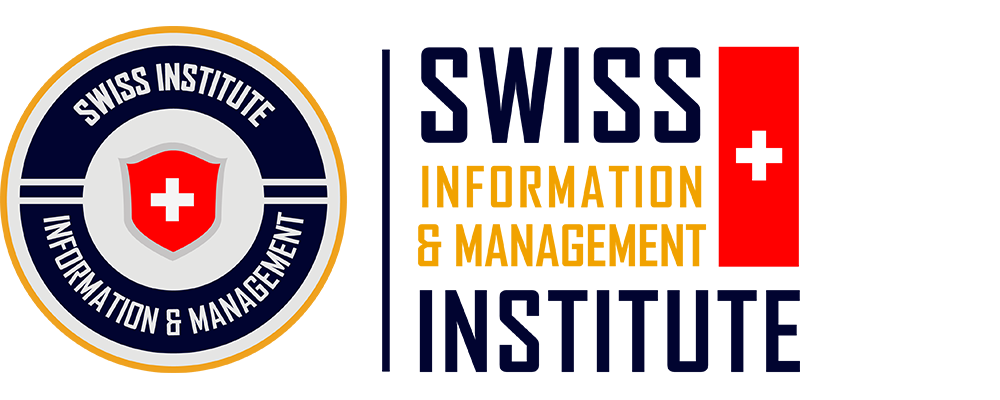The only Master of Arts in TESOL program in Switzerland aligned with the National Occupational Standard
The Master of Arts in Teaching English to Speakers of Other Languages (MA in TESOL) is an essential choice for professionals aspiring to excel in English language teaching and make a global impact in education. Modern TESOL programs transcend traditional teaching methods; they must embrace innovation, cultural adaptability, and effective strategies to meet the diverse needs of learners in an ever-changing global environment.
The MA in TESOL program at SIMI Swiss, developed by Swiss EduSchool, is expertly designed to provide an unparalleled education experience. It is one of the first TESOL programs to align with the European National Occupational Standard, offering students not only a prestigious MA degree from SIMI Swiss but also a set of professional certifications (Pro Recognize) to enhance their teaching and linguistic competencies upon graduation.
Additionally, the program ensures that students stay informed about the latest trends and developments in TESOL through participation in the Swiss Colloquium. It also provides opportunities to build professional networks within the global teaching community. Designed with working professionals in mind, the program offers comprehensive academic and language support through SIMI Swiss and its local academic partners, ensuring learners excel in their studies while addressing the demands of a global teaching career.
The SIMI Swiss Master of Arts in TESOL program offers globally recognized qualifications and understands the needs of Master’s students:
- Fully Accredited & Recognized
- The Swiss Student Card confirms official Swiss student status and eligibility with SIMI Swiss
- Certified & Micro-Credentials Included
- Multiple Qualifications from SIMI & Prestigious Universities
- Stay updated with the latest trends
- Flexible Learning Model
- Expand your business network
- Academic Support While Studying
- Tuition fee support provided by Swiss EduFund
Dual Qualifications within an Master of Arts in TESOL Program:
The Master of Business Administration program at SIMI Swiss is a dual-award program, where students receive two qualifications:
- Master of Arts in TESOL from Swiss Information and Management Institute
- Level 7 Diploma in Education Management and Leadership from OTHM, an Ofqual-regulated Awarding Body in the UK (603/4248/1)
International Accreditation
SIMI is accredited at both the institutional and programmatic levels by ASIC, HEAD, ISO 21001:2018, OTHM, and Qualifi, which is recognized by Ofqual.
Dual Qualification with OTHM
The program is widely recognized by the business community and partners, helping to optimize the use of the diploma after graduation.
30 Pro Recognize credentials
Learners earn 30 professional recognized certifications aligned with the European occupational framework, optimizing their skills upon graduation.
Academic & Research Support
The academic, research and language support system helps students overcome challenges so they can focus solely on excelling in their studies.
Courses & Learning Outcomes
1. Contemporary Issues in Education: Theory, Policy, and Practice (T/617/4998)
Overview
- Explores the interplay between educational theory, policy, and practice in addressing current challenges.
- Focuses on analyzing how contemporary issues impact teaching, learning, and institutional strategies.
Unit Aims
- Develop the ability to critically analyze current educational theories and their real-world applications.
- Evaluate the impact of policies on educational practices and outcomes.
- Understand approaches for addressing emerging challenges in education.
Course Details
This course is accredited and mapped to National Occupational Standards. It can also be accumulated towards earning a Master Award from SIMI Swiss if taken independently.
- View details on Learning Outcomes, Topics, and Suggested Readings HERE.
2. Management of Educational Change (A/617/4999)
Overview
- Examines the drivers, strategies, and impacts of change within educational settings.
- Focuses on equipping leaders with skills to design and implement effective change initiatives.
Unit Aims
- Develop the ability to analyze factors driving change in education.
- Critically evaluate strategies for managing educational change.
- Understand tools and approaches for successful change implementation.
Course Details
This course is accredited and mapped to National Occupational Standards. It can also be accumulated towards earning a Master Award from SIMI Swiss if taken independently.
- View details on Learning Outcomes, Topics, and Suggested Readings HERE.
3. Managing Effective Intercultural Communication and Perspectives (D/617/5000)
Overview
- Explores intercultural theories and communication strategies in diverse educational environments.
- Focuses on fostering inclusivity and understanding through effective communication and collaboration.
Unit Aims
- Develop the ability to analyze intercultural dynamics in education.
- Critically evaluate strategies for fostering effective communication in diverse educational settings.
- Understand tools for enhancing intercultural understanding and collaboration.
Course Details
This course is accredited and mapped to National Occupational Standards. It can also be accumulated towards earning a Master Award from SIMI Swiss if taken independently.
- View details on Learning Outcomes, Topics, and Suggested Readings HERE.
4. Pedagogy and Practice in Education (H/617/5001)
Overview
- Examines advanced pedagogical theories and teaching methodologies.
- Focuses on developing innovative practices to improve learning outcomes and teaching effectiveness.
Unit Aims
- Develop the ability to analyze and apply advanced pedagogical approaches.
- Critically evaluate the effectiveness of teaching practices.
- Understand innovative tools and methods to enhance educational delivery.
Course Details
This course is accredited and mapped to National Occupational Standards. It can also be accumulated towards earning a Master Award from SIMI Swiss if taken independently.
- View details on Learning Outcomes, Topics, and Suggested Readings HERE.
5. Leading Reflective Practice in Education (K/617/5002)
Overview
- Explores the principles of reflective practice and its role in professional growth.
- Focuses on strategies to foster reflective practices among educators and teams.
Unit Aims
- Develop the ability to analyze and implement reflective practices in education.
- Critically evaluate the role of reflection in personal and professional development.
- Understand strategies for cultivating reflective practices in educational teams.
Course Details
This course is accredited and mapped to National Occupational Standards. It can also be accumulated towards earning a Master Award from SIMI Swiss if taken independently.
- View details on Learning Outcomes, Topics, and Suggested Readings HERE.
6. Research Methods in Education (M/617/5003)
Overview
- Examines research methodologies and tools for conducting impactful educational research.
- Focuses on equipping learners with skills to design, analyze, and interpret educational studies.
Unit Aims
- Develop the ability to design and execute robust educational research projects.
- Critically evaluate research methodologies and their applications in education.
- Understand tools and techniques for data analysis and interpretation.
Course Details
This course is accredited and mapped to National Occupational Standards. It can also be accumulated towards earning a Master Award from SIMI Swiss if taken independently.
- View details on Learning Outcomes, Topics, and Suggested Readings HERE.
7. Teaching Reading and Writing (TESOL0702)
Overview
- Examines the nature and role of literacy across social, cultural, historical, and educational contexts.
- Focuses on understanding the development of reading and writing in both first and second languages, essential for TESOL practitioners.
Unit Aims
- Analyse the theories underlying reading and writing in the second language context.
- Compare the different strategies for teaching reading in the second language.
- Design and implement intensive and extensive reading programmes
- Discuss the importance of handwriting, spelling and grammar in writing.
- Identify specific techniques for teaching writing and initiate a writer’s workshop.
Topics
- Topic 1 – The Nature of Reading
- Topic 2 – Models of Reading
- Topic 3 – Reading and the Second Language Reader
- Topic 4 – Social Contexts and Motivation to Read
- Topic 5 – Individual Student Variation
- Topic 6 – Reading and Vocabulary Development
- Topic 7 – Strategic and Fluent Reader
- Topic 8 – Extensive and Intensive Reading
- Topic 9 – Theoretical Orientations to Second Language Writing
- Topic 10 – Learning to Write in the Second Language
- Topic 11 – Writing Process
- Topic 12 – Response, Error Correction and Grading
- Topic 13 – Second Language Writing and Culture
- Topic 14 – Writer’s Workshop Approach
Course Details
This course is accredited and mapped to National Occupational Standards. It can also be accumulated towards earning a Master Award from SIMI Swiss if taken independently.
- View details on Learning Outcomes, Topics, and Suggested Readings HERE.
8. Teaching Listening and Speaking (TESOL0701)
Overview
- Explores theories, strategies, and techniques for teaching listening and speaking skills.
- Focuses on designing and assessing listening and speaking activities to enhance language development.
- Examines spoken discourse, oral fluency, and their roles in fostering effective communication.
Unit Aims
- Explain why listening & speaking skills should be developed.
- Analyse the teaching listening and speaking theories in a second language
- Implement different techniques & strategies in teaching listening & speaking skills.
- Design and develop listening and speaking activities
- Assess listening & speaking skills in a second language.
Topics
- Topic 1 – Listening as Comprehension & Listening as Acquisition
- Topic 2 – Cyclical Approach in Teaching Listening
- Topic 3 – Principles of Developing Listening Activities
- Topic 4 – Types of Meaning for Listening
- Topic 5 – Examples of Listening Activities
- Topic 6 – Learning Styles and Listening Strategies
- Topic 7 – Functions of Speaking
- Topic 8 – Talk as Interaction, Transaction and Performance Topic 9 – Types of Speaking Activities
- Topic 10 – Assessment of Speaking
- Topic 11 – Teaching Pronunciation in a Second or Foreign Language
- Topic 12 – Speaking and Listening Fluency
Course Details
This course is accredited and mapped to National Occupational Standards. It can also be accumulated towards earning a Master Award from SIMI Swiss if taken independently.
- View details on Learning Outcomes, Topics, and Suggested Readings HERE.
9. Language Assessment and Testing (603/3788/2)
Overview
- Develops learners' research skills, including understanding various research approaches and planning research activities.
- Focuses on formulating research proposals, analyzing and interpreting data, and linking research to evidence-based practice.
- Emphasizes the practical application of research methodologies in educational and professional contexts.
Unit Aims
- Explain the purpose of language assessment.
- Identify the principles for designing and developing language tests.
- Design and develop tests for measuring writing, speaking, listening and reading.
- Suggest the use of authentic assessment.
Topics
- Topic 1 – Role and Purpose of Testing and Evaluation
- Topic 2 – Principles of Test and Measurement
- Topic 3 – Limitation of Tests
- Topic 4 – Basic Statistics and Measurement
- Topic 5 – Reliability of Tests
- Topic 6 – Validity of Tests
- Topic 7 – Item Analysis
- Topic 8 – Different Formats of Assessment
- Topic 9 – Objective Language Tests
- Topic 10 – Subjective Language Tests
- Topic 11 – Technology in Assessment
- Topic 12 – Authentic Assessment
Course Details
This course is accredited and mapped to National Occupational Standards. It can also be accumulated towards earning a Master Award from SIMI Swiss if taken independently.
- View details on Learning Outcomes, Topics, and Suggested Readings HERE.
Entry requirements & Learning methods
1. Entry Requirements
In addition to the entry requirements, candidates applying to the program are also assessed for their suitability by the admissions committee before joining the program to ensure that they can acquire and benefit from the program.
Entry requirements:
To enroll this program, learners must possess one of the criteria below:
- A Bachelor’s qualification in Majors from accredited universities;
- Or a Level 6 EQF diploma or an equivalent qualification from organizations that are authorized to issue qualifications and have been accredited.
English requirements:
If a learner is not from a predominantly English-speaking country, proof of English language proficiency must be provided.
- Common European Framework of Reference (CEFR) level B2 or equivalent;
- Or A minimum TOEFL score of 101 or IELTS 6.5; Reading and Writing must be at 6.5 or equivalent.
Please note:
- SIMI Swiss does not accept entry qualifications from counterfeit universities, Diploma Mills, or universities accredited by unreliable accreditation agencies.
- SIMI reserves the right to make admissions decisions based on the requirements of recognized agencies and the global quotas of the program.
2. Learning methods
The qualification is designed to be delivered over 1,5 academic years for full-time study, but it also offers a flexible model to accommodate part-time and distance learning options.
The qualification is delivered in the following modes:
1. On-campus Mode in Switzerland
- Blended Learning: Combines the benefits of traditional classroom instruction with the flexibility of online learning, allowing students to participate in in-person sessions on campus while also benefiting from digital resources such as online lectures, discussion forums, and virtual collaborative tools.
- Full-time Learning: Involves attending campus-based classes on a set schedule, allowing for closer interaction with professors, peers, and industry professionals. Students also have the opportunity to participate in various extracurricular activities, internships, and on-campus events, providing them with a well-rounded experience.
Learn more about SIMI Campuses [HERE]
2. Off-campus Mode:
The program combines Live Classes with lecturers and local tutors (where applicable) for a hybrid learning experience.
- Offering interactive, real-time engagement with instructors.
- Local tutors provide additional guidance to help learners apply theoretical concepts to practical scenarios (please note that local tutors only apply where SIMI has a scientific partner).
- Ideal for busy professionals seeking flexibility with personalized support.
Learn more about the overview of enrolling in online classes at SIMI Swiss [Video HERE]
Learn more about the effectiveness of SIMI Pedagogy [Video HERE]
3. Fully Online Mode:
The program is implemented using a combined automated training model that includes:
- Optimized Online Learning System: Designed to enhance the self-study process.
- Bite-Sized Lectures: Lessons are structured in short, manageable modules, enabling students to grasp the content immediately after completing each module.
- Comprehensive Support System: Provides students with the necessary tools and support to efficiently fulfil course requirements.
Learn more about how to use the automated training model at SIMI Swiss [Video HERE]
3. Academic Support
We understand that pursuing an accredited postgraduate program can be both exciting and challenging, especially for busy adult learners. To help you overcome these challenges, we’ve created the SIMI Swiss Supporting Systems, designed to guide you through any difficulties during your studies.
For a full overview of the support available, be sure to watch our informative videos, offering help at every stage of your academic journey.
Supplemental resources and Master Pro Certified
1. Supply 30 courses mapped to National Occupational Standards
The National Occupational Standard is a crucial benchmark that ensures educational programs meet workplace demands. The MBA Swiss program is fully aligned with the Senior Leader position according to the national competency framework.
Beyond the comprehensive MBA curriculum, students gain access to an additional 30 professional modules covering a wide range of specializations. This expanded knowledge base enables students to build on their classroom learning and directly apply it to their specific job roles and needs, offering valuable tools for professional growth.
Unlike other study materials, this interactive and exclusive set of resources, developed by SIMI Swiss, is specifically designed for self-study. The knowledge system, aligned with the National Occupational Standard, is divided into 30 knowledge groups, each further broken down into bite-sized lessons. This approach allows students to absorb content quickly and effectively, even when away from their computer or phone.
- Learn more about the National Occupational Standard system [HERE].
- Learn more about the exclusive pedagogy for the supplemental interactive study materials [HERE].
- Learn more about the Master Professional Certified [HERE]
The 30 interactive courses that enhance knowledge and automatically accumulate 30 separate Master Pro Certifications include:
- Qualities of effective leadership: Learners will explore the making and developing of powerful leaders.
- Developing interpersonal skills: Connecting and bonding with people within the commercial sectors is extremely important for good business. This module trains learners in skills to improve and enhance communication techniques to create strong bonds.
- Motivating and influencing people: Inspiring people to create a unity of direction within business.
- Making decisions: Doing the right things in the right way at the right time. Learners will look at the process of making a good decision.
- Creativity and problem-solving: Do problems pose a threat or are they an opportunity to improve? Here, learners will figure out how to turn a problem into an advantage.
- Studying and using management theories: There are many theories concerned with management and the various models developed from these theories. This module looks over these theories with real-life examples.
- The external operating environment of business: Planning for influences on the business outside your control.
- Culture and ethics: The culture and ethics involved in the business world today.
- Governance and directorships: Structuring and controlling a business in a professional way.
- Analysing the competition: What are my competitors doing, how are they doing it, and why are they doing it? Reviewing and analysing competitors’ actions to enhance managerial roles.
- Marketing strategy: Creating an effective and successful market presence. Looking at the development of marketing strategies to create successful marketing campaigns.
- High performance sales: Learners will grasp the key elements of successful selling.
- E-Marketing communication: Understanding and using effective electronic messages to market.
- Customers and their needs: Ensuring that your customers are recognised and valued.
- Strategic human resource management: Human Resource Management must play a central role in the strategy of any organization. It is concerned with people as an asset of the business.
- Recruiting and CPD: Getting the best people. Developing the best people. Keeping the best people.
- Measuring and rewarding performance: Knowing and measuring how your people are performing.
- Interpreting business accounts: Using and understanding the litmus tests of business health.
- Tools of financial analysis: Resources, tools, and techniques to keep a finger on the pulse of the business.
- Managing cash and working capital: Cash, cash flow, and working capital. The lifeblood of business.
- Exercises in quantitative techniques: How to use and understand key figures.
- Impact of technology on business: Analyse and exploit the role of e-business within a business sector.
- Innovation and R&D: Creating commercial advantage from innovation and research.
- Implementing and managing quality systems: Right first time, right every time. The place of quality in business strategy.
- Strategic planning tools: Resources, tools, and ideas to help create an effective business strategy.
- Strategic and systems management: Options for strategic direction. Making the right choices for your business.
- The business plan: Creating a plan that targets the stated aims and objectives of a business.
- Developing high-performance teams: Cohesion and teamwork that enhances business performance.
- Managing projects: Getting things done. Using the right tools to run projects.
- Strategies for growth: This module explores the different ideas of growth and the various tools, measures, and controls at a manager’s disposal in planning for growth.
2. Supply 30 webinars mapped to National Occupational Standards
In addition to comprehensive lessons with built-in interactive activities and an exclusive self-study pedagogy, each knowledge module aligned with the National Occupational Standard includes instructional videos (webinars). Students are provided with 30 video webinars corresponding to the 30 interactive modules, ensuring a well-rounded and complete learning experience.
The 30 video webinars include:
- Webinar - Qualities of effective leadership: Learners will explore the making and developing of powerful leaders.
- Webinar - Developing interpersonal skills: Connecting and bonding with people within the commercial sectors is extremely important for good business. This module trains learners in skills to improve and enhance communication techniques to create strong bonds.
- Webinar - Motivating and influencing people: Inspiring people to create a unity of direction within business.
- Webinar - Making decisions: Doing the right things in the right way at the right time. Learners will look at the process of making a good decision.
- Webinar - Creativity and problem-solving: Do problems pose a threat or are they an opportunity to improve? Here, learners will figure out how to turn a problem into an advantage.
- Webinar - Studying and using management theories: There are many theories concerned with management and the various models developed from these theories. This module looks over these theories with real-life examples.
- Webinar - The external operating environment of business: Planning for influences on the business outside your control.
- Webinar - Culture and ethics: The culture and ethics involved in the business world today.
- Webinar - Governance and directorships: Structuring and controlling a business in a professional way.
- Webinar - Analysing the competition: What are my competitors doing, how are they doing it, and why are they doing it? Reviewing and analysing competitors’ actions to enhance managerial roles.
- Webinar - Marketing strategy: Creating an effective and successful market presence. Looking at the development of marketing strategies to create successful marketing campaigns.
- Webinar - High performance sales: Learners will grasp the key elements of successful selling.
- Webinar - E-Marketing communication: Understanding and using effective electronic messages to market.
- Webinar - Customers and their needs: Ensuring that your customers are recognised and valued.
- Webinar - Strategic human resource management: Human Resource Management must play a central role in the strategy of any organization. It is concerned with people as an asset of the business.
- Webinar - Recruiting and CPD: Getting the best people. Developing the best people. Keeping the best people.
- Webinar - Measuring and rewarding performance: Knowing and measuring how your people are performing.
- Webinar - Interpreting business accounts: Using and understanding the litmus tests of business health.
- Webinar - Tools of financial analysis: Resources, tools, and techniques to keep a finger on the pulse of the business.
- Webinar - Managing cash and working capital: Cash, cash flow, and working capital. The lifeblood of business.
- Webinar - Exercises in quantitative techniques: How to use and understand key figures.
- Webinar - Impact of technology on business: Analyse and exploit the role of e-business within a business sector.
- Webinar - Innovation and R&D: Creating commercial advantage from innovation and research.
- Webinar - Implementing and managing quality systems: Right first time, right every time. The place of quality in business strategy.
- Webinar - Strategic planning tools: Resources, tools, and ideas to help create an effective business strategy.
- Webinar - Strategic and systems management: Options for strategic direction. Making the right choices for your business.
- Webinar - The business plan: Creating a plan that targets the stated aims and objectives of a business.
- Webinar - Developing high-performance teams: Cohesion and teamwork that enhances business performance.
- Webinar - Managing projects: Getting things done. Using the right tools to run projects.
- Webinar - Strategies for growth: This module explores the different ideas of growth and the various tools, measures, and controls at a manager’s disposal in planning for growth.
3. Earn 30 Master Pro Certifications via automated testing
While an MBA degree certifies academic achievement at the Master's level, in the workplace, Master Pro Certifications help professionals demonstrate their knowledge, skills, and ability to take responsibility in their specific fields.
As a program mapped to National Occupational Standards, along with the supplemental knowledge system, students can engage in self-study through interactive lessons, attend webinars, and take online tests to earn 30 Master Pro Certifications. Each ProCert reflects Level 7 (Master Level), outlines the Learning Outcomes, and provides certification upon completion.
If students wish to convert their e-Master Pro Certifications to hard copies, they can use an optional service for a minimal fee.
The 30 Master ProCerts that learners can obtain during the MBA Swiss program (note: this is optional):
- Level 7 Certified for Qualities of effective leadership
- Level 7 Certified for Developing interpersonal skills
- Level 7 Certified for Motivating and influencing people
- Level 7 Certified for Making decisions
- Level 7 Certified for Creativity and problem-solving
- Level 7 Certified for Studying and using management theories
- Level 7 Certified for The external operating environment of business
- Level 7 Certified for Culture and ethics
- Level 7 Certified for Governance and directorships
- Level 7 Certified for Analysing the competition
- Level 7 Certified for Marketing strategy
- Level 7 Certified for High performance sales
- Level 7 Certified for E-Marketing communication
- Level 7 Certified for Customers and their needs
- Level 7 Certified for Strategic human resource management
- Level 7 Certified for Recruiting and CPD
- Level 7 Certified for Measuring and rewarding performance
- Level 7 Certified for Interpreting business accounts
- Level 7 Certified for Tools of financial analysis
- Level 7 Certified for Managing cash and working capital
- Level 7 Certified for Exercises in quantitative techniques
- Level 7 Certified for Impact of technology on business
- Level 7 Certified for Innovation and R&D
- Level 7 Certified for Implementing and managing quality systems
- Level 7 Certified for Strategic planning tools
- Level 7 Certified for Strategic and systems management
- Level 7 Certified for The business plan
- Level 7 Certified for Developing high-performance teams
- Level 7 Certified for Managing projects
- Level 7 Certified for Strategies for growth
Check out the way you could get 30 electric Master Professional Certified [Video HERE]
Program accreditations
1. Accreditation review guidelines by SIMI Swiss
SIMI is the first higher education institute in Zug, Switzerland, to achieve comprehensive international accreditations at both the organizational and program levels. The video below guides you through the step-by-step process of verifying and checking SIMI Swiss's accreditations and recognitions. All MBA Swiss programs, owned by SIMI Swiss, benefit from these quality standards.
2. Refer to SIMI Swiss information in SVEB Switzerland
SVEB Switzerland (Schweizerischer Verband für Weiterbildung) is the Swiss Federation for Adult Learning and serves as the national umbrella organization for adult education in Switzerland. SVEB is recognized as the leading authority in Switzerland for promoting and supporting lifelong learning and professional development through a wide range of educational programs and certifications.
Benefits of the SIMI Swiss Program Published in SVEB:
- National & Federal Recognition: Being published in SVEB gives the SIMI Swiss program official recognition in Switzerland, validating its quality and adherence to Swiss educational standards.
- Increased Credibility: Membership and listing with SVEB enhance the credibility of the SIMI Swiss program, making it more attractive to prospective students and employers who value SVEB-approved programs.
- Professional Advancement: Programs listed with SVEB are often aligned with the needs of the Swiss job market, increasing graduates' employability and supporting their career progression within Switzerland.
- Access to a Wider Network: Association with SVEB connects the SIMI Swiss program to a broader network of educational institutions, professionals, and employers across Switzerland, offering opportunities for collaboration, networking, and knowledge exchange.
- Compliance with Swiss Standards: SVEB ensures that MBA Swiss programs meet high educational standards, including up-to-date content, qualified instructors, and effective teaching methods, enhancing the overall learning experience for students.
- Support for Lifelong Learning: SVEB’s focus on adult education means the SIMI program aligns with lifelong learning principles, supporting students in their ongoing professional development.
Check the SIMI Swiss program on SVEB HERE.
3. Accreditation of Level 7 Diploma in Education Management and Leadership of OTHM
The MA in TESOL program at SIMI Swiss offers a dual degree in partnership with OTHM, the Ofqual UK.Gov awarding body:
- Recognized as an organization by the educational authority of the United Kingdom, Ofqual (UK.Gov). Recognition Number: RN5284. Refer to the recognition information CLICK HERE
- OTHM Level 7 Diploma in Education Management and Leadership is accredited with the Ofqual UK.Gov code 603/4248/1. Refer to the accreditation information CLICK HERE
Reference:
- Guidelines of how to check the recognition of OTHM: CLICK HERE
- Why Level UK offers optimal educational effectiveness for learners?: CLICK HERE
- The meaning of Level System in the labor market in the context of global labor mobility: CLICK HERE
- The meaning of Level System in global diploma recognition: CLICK HERE
Sample Level 7 Diploma:
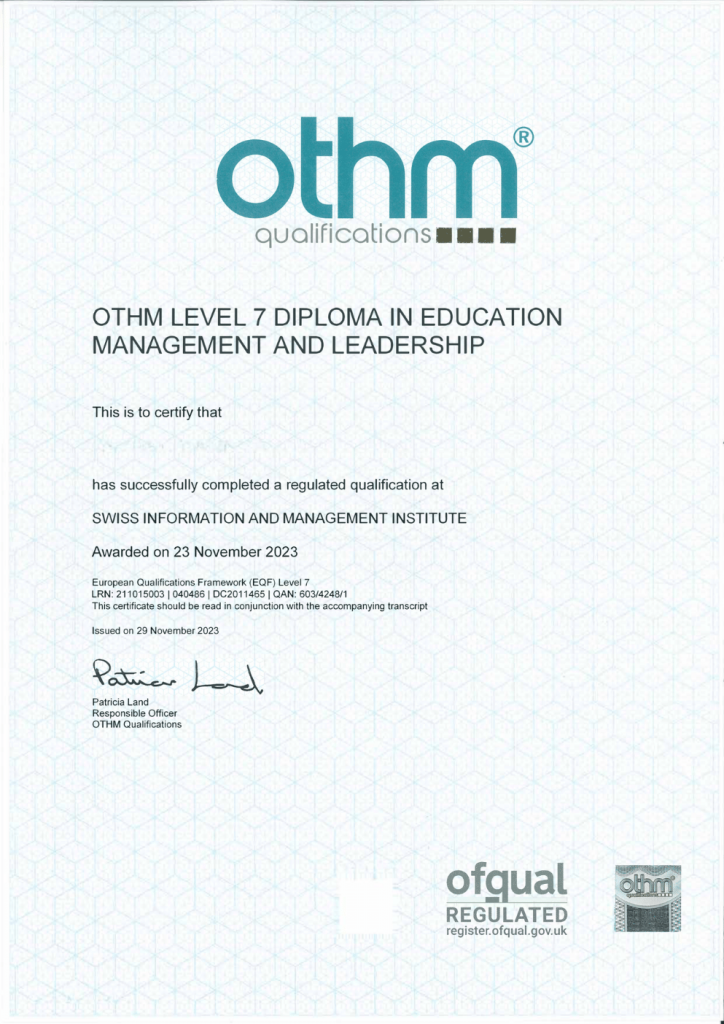
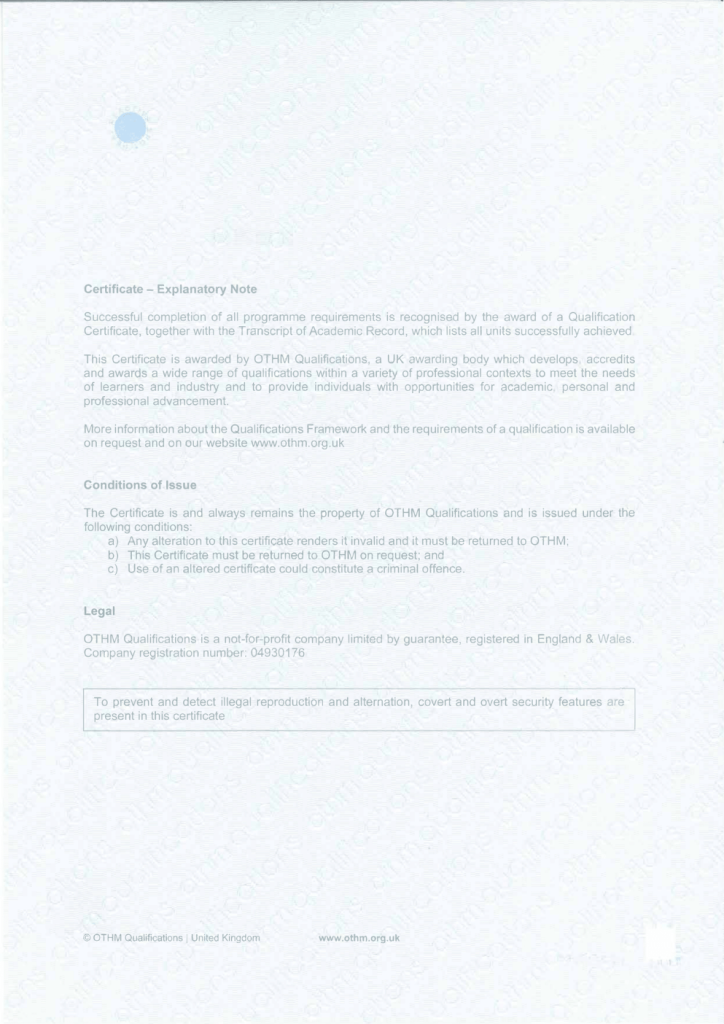
Sample Level 7 Transcript:
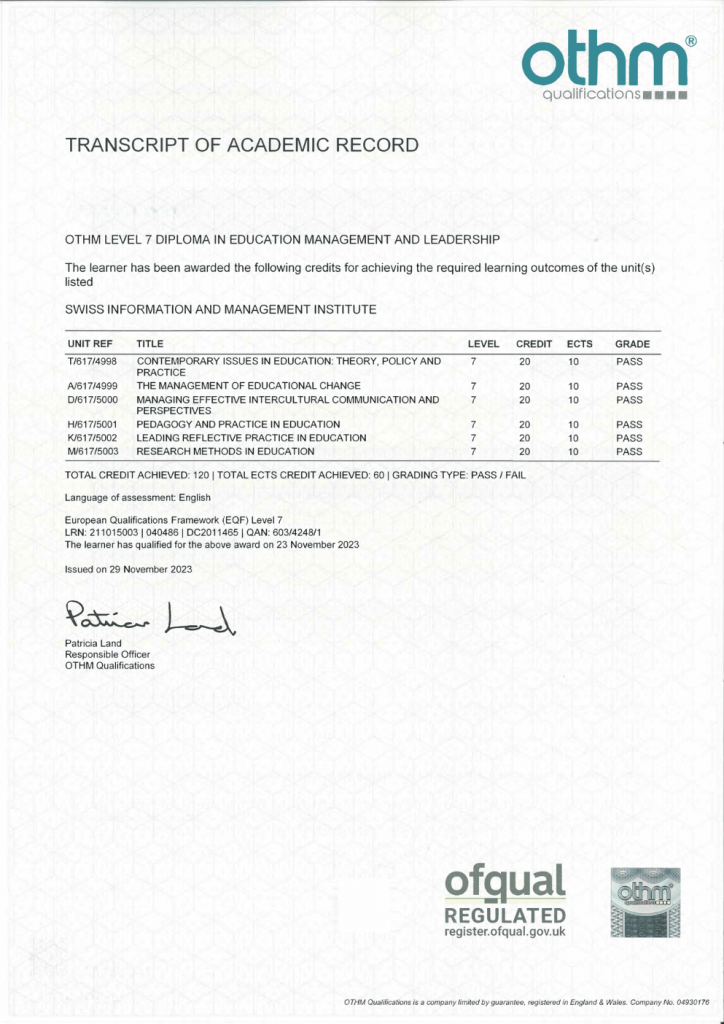
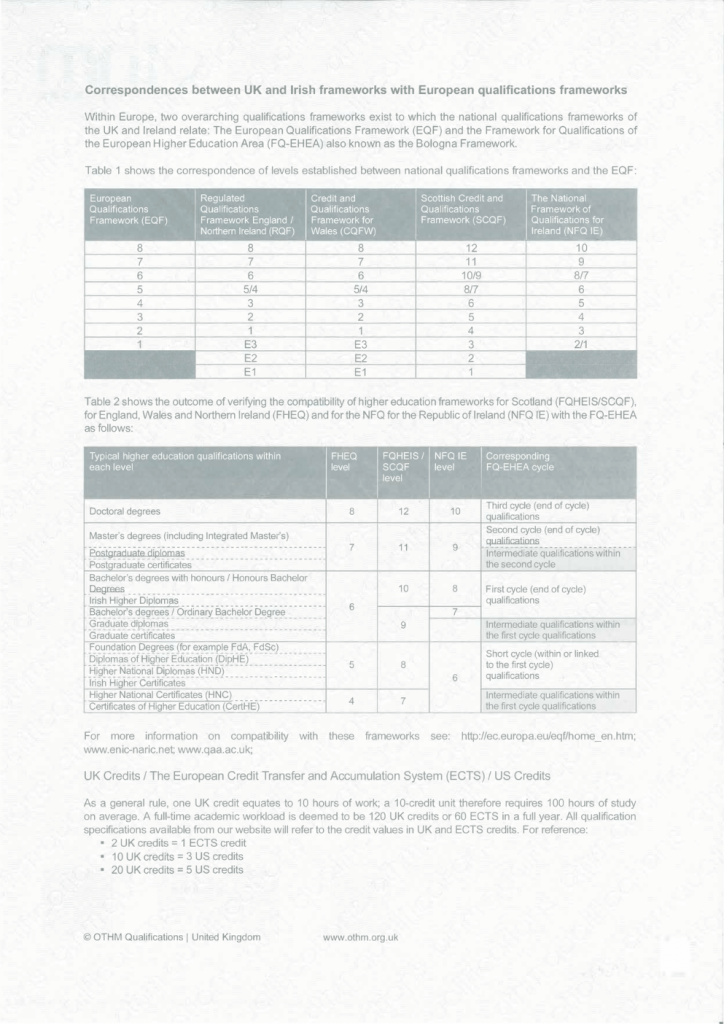
You will get
Dual Master
30 Pro Recognized
Swiss Student Card
Academic Support
Update Trend
All Master Programs
Fully Accredited
Multi Recognition
Master of Business Administration
Powered by BizSchool of Zug
Master of Education Management & Innovation Pedagogy
Powered by Swiss EduSchool
Master of TESOL
Powered by Swiss EduSchool
Master of Human Resource and Talent Management
Powered by SHRM Switzerland
Master of Logistics & Supply Chain Management
Powered by LSCM Switzerland
Master of Information Technology
Powered by IT Institute of Switzerland
Master of Psychology
Powered by Swiss PsySchool
